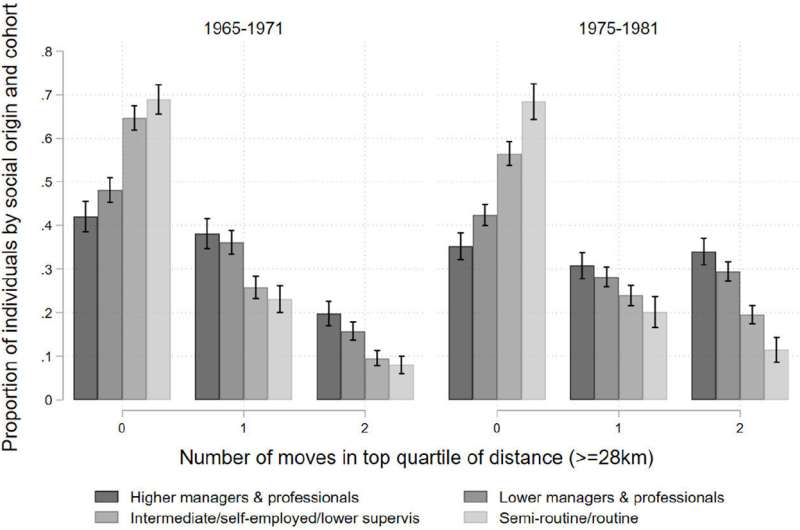Class background still marker for 'success' in later life, research shows

Class background remains a barrier to accessing opportunities in later life, even among those who are successful, research by the University of York has found.
In a study of more than 8,000 professionals and higher-level managers, researchers found that those who came from a wealthy background were much more likely to move around the UK, and live in some of the most affluent areas, compared to those from working-class backgrounds..
The study involved a longitudinal analysis of census data about people born between 1965 and 1981 who were working in higher managerial and professional occupations by the age of 30 to 36.
Level of affluence
Dr. Daniel McArthur, from the University of York's Department of Education, says, "We explored whether people had moved home over a distance of 28 km from when they were aged 10 to 16, considered the occupations of their parents, how often they moved, and the level of affluence of the area they moved to.
"We found that approximately 60% of those with higher managerial and professional parents made at least one long-distance move, compared to those whose parents were in more 'routine' jobs, where only 30% had moved.
"Higher managers and professionals were more likely to live in affluent areas as children than those from disadvantaged backgrounds."
Area gap
The study, in collaboration with Katharina Hecht from Northeastern University, in Boston, US, showed this "area gap" persists through to adulthood, with those from less privileged backgrounds unable to close the gap on their peers even when they do move areas.
Those who have higher managers and professionals as parents are more likely to receive transfer of wealth, which puts them in an even better position to be able to buy houses in more advantaged areas in later life.
Location matters
Dr. McArthur says that "where people live matters for their access to well paying jobs and good schools for their children. As a result, the ability of those from affluent backgrounds to move to wealthier areas is likely to make it easier for them to pass their advantages on to their children."
The research suggests that policymakers should be aware that barriers preventing the upwardly mobile moving to some of the UKs most economically dynamic areas may have implications not only for long-term inequalities, but also for innovation and productivity, as particular areas of the country will "miss out" on the skills and talents of people who are unable to live there.
More research is needed to understand what policy measures could make it easier for people from disadvantaged backgrounds to move areas.
The research is published in the journal Sociology.
More information: Katharina Hecht et al, Moving on up? How Social Origins Shape Geographic Mobility within Britain's Higher Managerial and Professional Occupations, Sociology (2022). DOI: 10.1177/00380385221113669
Journal information: Sociology
Provided by University of York





















